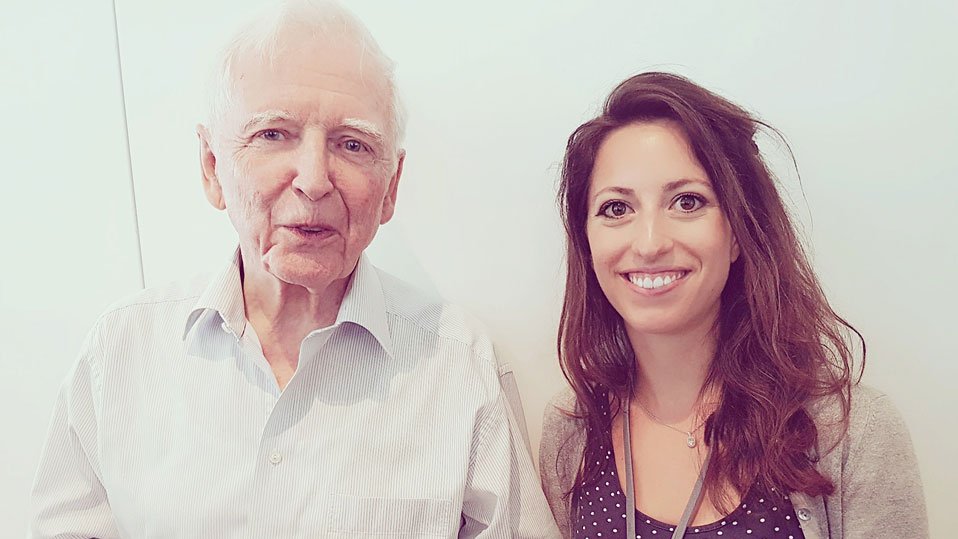TUM student Ana Cirac in Lindau
“Nobel Prize winners are normal people”

Ana, you are one of a few selected students who were allowed to attend the conference in Lindau. How did that happen?
Ana Cirac: Quite unspectacular, actually: the topic of the conference alternates on the basis of the three different scientific disciplines of the Nobel Prize. This year, the conference was about Physiology and Medicine. I am a student of Medicine, and I received an e-mail from TUM in which I was asked whether I would like to go to Lindau. I had to submit two letters of recommendation. Soon after, I received a confirmation.
The participants meet up in Lindau for one week. How exactly did the conference go about?
There was a variety of different program points to participate in. In the run-up, I could choose which lectures, discussions, master classes and/or podium discussions I wanted to visit. Of course, there were meals together with the Nobel laureates, and it was possible to talk to them in the free time. One of the highlights was an excursion to the island of Mainau on the last day of the conference – followed by a party on a ship.
Which Nobel Prize winners did you meet?
I was mainly interested in medical experts in fields of research similar to mine. For my doctoral thesis, I conducted research on the Epstein-Barr virus, which is known to cause cancer. Thus, I was especially happy to get to know Prof. Harald zur Hausen. His specialist field is the emergence of cancer from viral infections. In 2008, he was awarded the Nobel Prize in Medicine because he discovered HP-viruses that cause cervical cancer.
What impressions did you get from the conference?
It might sound a bit naïve, but Nobel Prize winners are normal people. On one of the dinner evenings, I talked to the Australian immunologist Prof. Peter Doherty for quite a while: we have the same fitness watch and I was able to help him with the settings because his watch was always beeping. Our conversation was really pleasant and down-to-earth.
Which Nobel Prize winner impressed you the most?
I find Harald zur Hausen incredibly impressive. He is 82 years old, and he still works at the Deutsches Krebsforschungszentrum in Heidelberg every day. Many Nobel Prize winners decide to wrap up their careers after being awarded the prize – unlike Mr. zur Hausen, who still conducts research and always comes up with something new. In my opinion, he could even be awarded another Nobel Prize for his current research on new infectious carcinogenic agents and colon cancer.
What did you learn from the meeting?
We didn’t just talk about subject-specific matters, but also about how to do research and about general issues. Above all, I learned that you should not focus on prizes when conducting research – but to pursue research questions that are fun and that you feel enriched by.
…which is not to be taken for granted.
Right! You should try not to be tempted or distracted. Nowadays, as a researcher, you have to aim for a long list of publications because that’s the only way to generate research funding. As a result, many others will follow a trend – and if a certain topic has become popular, many researchers will try to publish about it as well, no matter if their findings are sound enough.
Would you like to become a Nobel Prize winner one day?
That would be great, of course, but I won’t push it. I my opinion, it is not only the award itself that is so great about the Nobel Prize. The great thing about it is that society will listen to Nobel Prize winners, allowing them to point out problems and to criticize, and perhaps make a difference. For example, many Nobel Prize winners have already warned about the downsides of commercialized research. Journals such as “Nature” or “Science” have so much power that they have influence on the research topics and even on the research findings. Thus, popular topics are hyped – and those with little appeal are neglected.
What are your plans for the future?
At the moment, I am in the practical year of my studies. I’m working at the Klinikum rechts der Isar right now, and I’m going to visit the New York Presbyterian Hospital for two months to complete my studies. In the long run, I would like to stay in Munich. My dream job would be to work in the field of Neurology at the Klinikum rechts der Isar. Let’s see what life brings!
(Interview: Sabrina Czechofsky)
Ana Cirac was born in Spain and came to Germany as a child, together with her parents. After completing her “Abitur”, she started studying Medicine in Munich. Her hobbies include Stand Up Paddling and Yoga.
More information:
Lindau Nobel Laureate Meeting 2018